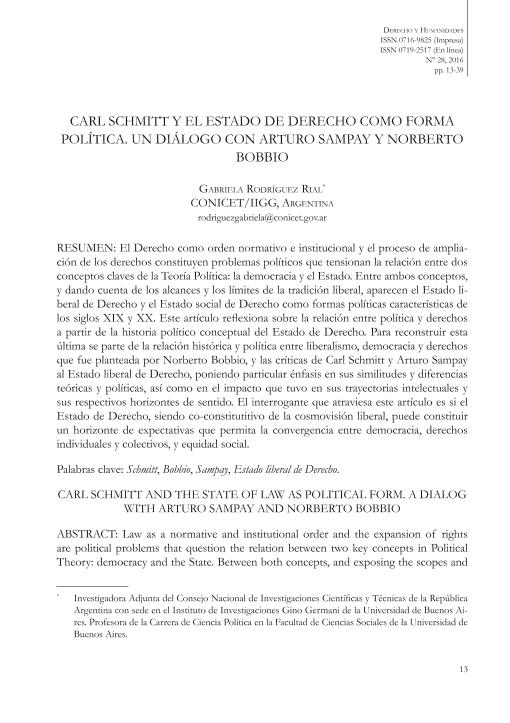Artículo
El Derecho como orden normativo e institucional y el proceso de ampliación de los derechos constituyen problemas políticos que tensionan la relación entre dos conceptos claves de la Teoría Política: la democracia y el Estado. Entre ambos conceptos, y dando cuenta de los alcances y los límites de la tradición liberal, aparecen el Estado liberal de Derecho y el Estado social de Derecho como formas políticas características de los siglos XIX y XX. Este artículo reflexiona sobre la relación entre política y derechos a partir de la historia político conceptual del Estado de Derecho. Para reconstruir esta última, se parte de la relación histórica y política entre liberalismo, democracia y derechos que fue planteada por Norberto Bobbio, y las críticas de Carl Schmitt y Arturo Sampay al Estado liberal de Derecho, poniendo particular énfasis en sus similitudes y diferencias teóricas y políticas, así como en el impacto que tuvo en sus trayectorias intelectuales y sus respectivos horizontes de sentido. El interrogante que atraviesa este artículo es si el Estado de Derecho, siendo co-constitutitivo de la cosmovisión liberal, puede constituir un horizonte de expectativas que permita la convergencia entre democracia, derechos individuales y colectivos, y equidad social. Law as a normative and institutional order and the expansion of rights are political problems that question the relation between two key concepts in Political Theory: democracy and the State. Between both concepts, and exposing the scopes and limitations of the liberal tradition, there arise the Liberal State of Law and the Social State of Law as the two main political forms of the 19th and 20th centuries. The aim of this article is to reflect on the relationship between politics and rights by tracing the political and conceptual history of the State of Law. In order to reconstruct the latter, we start from the historical and political relationship between liberalism, democracy and rights established by Norberto Bobbio, and Carl Schmitt and Arturo Sampay’s criticism against the Liberal State of Law. We seek to emphasize their theoretical and political differences and similarities, as well as their impact on the authors’ intellectual paths and horizons of meaning. The question that motivates this article is whether the State of Law, as a co-constitutive element of the liberal world-view, can become a horizon of expectation where democracy, individual and collective rights and social equity can converge.
Carl Schmitt y el Estado de Derecho como forma política: Un diálogo con Arturo Sampay y Norberto Bobbio
Título:
Carl schmitt and the state of law as political form: A dialog with Arturo Sampay and Norberto Bobbio
Fecha de publicación:
12/2016
Editorial:
Universidad de Chile. Facultad de Derecho
Revista:
Derecho y Humanidades
ISSN:
0716-9825
e-ISSN:
0719-2517
Idioma:
Español
Tipo de recurso:
Artículo publicado
Clasificación temática:
Resumen
Palabras clave:
Schmitt
,
Estado de Derecho
,
Bobbio
,
Sampay
Archivos asociados
Licencia
Identificadores
Colecciones
Articulos(SEDE CENTRAL)
Articulos de SEDE CENTRAL
Articulos de SEDE CENTRAL
Citación
Rodriguez, Gabriela; Carl Schmitt y el Estado de Derecho como forma política: Un diálogo con Arturo Sampay y Norberto Bobbio; Universidad de Chile. Facultad de Derecho; Derecho y Humanidades; 28; 12-2016; 13-39
Compartir




